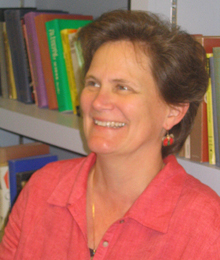Scholar on VTech Tragedy: Theodicy Has Many Faces

To take a deeper look at theodicy, ReligionWriter spoke with Wendy Farley, a professor of religion at Emory University in Atlanta,
Below is an edited Q+A with her. (WARNING: Some Biblical literacy required.)
ReligionWriter: First of all, what is theodicy?
Wendy Farley: It’s a religious attempt to think about the idea that if God is all-powerful and all-good, then how can there be suffering and evil in the world?
RW: Is our modern American understanding of evil and suffering different from that found among people in the Bible?
Farley: There is a range of possible interpretations of theodicy, and almost all of these are found in the Bible. People continue to struggle within that range of possibility.
RW: What is that range?
Farley: The “Zeus” model is God is mad and punishing us, and that’s why we suffer — you can find that idea in the Bible. Then there’s Job, who is an example of innocent suffering. He testifies to God: “Why am I suffering when I am a good man?” God responds by being present to Job, not giving an explanation except the compassionate power of that presence itself.
RW: But God appears in a whirlwind and says, “Job, you weren’t there when I created the earth.” That doesn’t sound very comforting.
Farley: God lays out for Job the incredible beauty and complexity of creation and basically says, “This doesn’t work by small legal views of justice. But I love it all, and I love you.” God gets very angry at Job’s three comforters, who were saying to him, “Just admit that you were bad, and God will forgive you.” God says about them, “That’s not right.” God displays his care for Job in the midst of inevitable suffering.
RW: If you imagine yourself in Job’s situation, sitting on an ash-heap, scraping your sores with a pot shard — just like the Virginia Tech students today, looking around at this tragedy — how can you be a position to feel that loving presence?
Farley: It’s an existentially hard place to be in. It’s a place of terrible suffering. We want answers, that’s the way we’re made. The answer that, “God is in charge, bad things happen but still the world makes sense,” is an existentially powerful answer, and people find that comforting. That’s one of the options of the Bible, it’s one people have kept around for thousands of years, and you find versions of it in most of the religious traditions. It’s just not the only option.
RW: What are the other ways the Bible explain suffering?
Farley: From a Christian point of view, one way is to understand the coming of the Messiah as a continuation of the view of the Book of Job, namely, that God simply comes to us and is present to us. We have in the Passion the deepest possible intimacy of God with unjust suffering. There’s no suffering that we human being experience where God is not present to us. There is nothing, as Paul says, that can separate us from the love of God.
RW: God appeared to Job, but how do you feel the love of God if He doesn’t come to you in the whirlwind?
Farley: We feel it in prayer, we feel it in the care we give one another. Part of the Incarnation is God’s presence to us through each other, as Christ said, “When I was naked, you fed me.” There’s no theodicy that’s going to make it okay for people to suffer. But like most human beings, who have suffered very severely, I can say the presence of God isn’t taken away in suffering. It’s very empowering. Not that it makes you not suffer, but it makes you get through it with a grace and courage and beauty and dignity. We see people going through horrific things and responding with real moral beauty.
RW: Are you happy with the coverage theodicy gets in the press after disasters and tragedies?
Farley: The press doesn’t mediate a deep understanding of these issues. The press does what it’s supposed to do, which is not to be pastoral. I wouldn’t look to the press for a way to navigate tragedy. I do find the press tends to go to conservative ministers [as sources], which is not where I would go for comfort.
RW: You think the press tends to go to conservative sources in order to get a firm answer?
Farley: Probably. You are more likely to get a sound bite.
RW: Here we are on Tuesday, ages away from Sunday morning, and I wonder if people do look for spiritual answers in press reports.
Farley: I’m sure that’s true. That is a little frightening (laughs.) Reporters should be aware there are a variety of faithful ways of responding to suffering and catastrophe.
